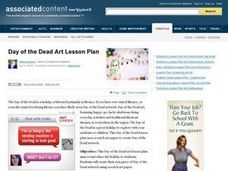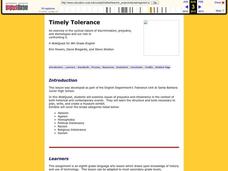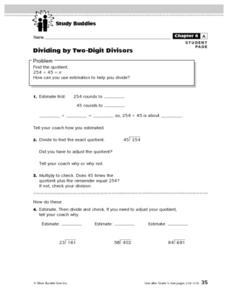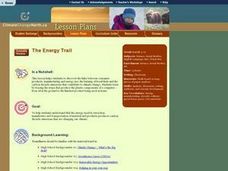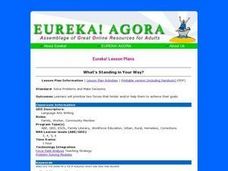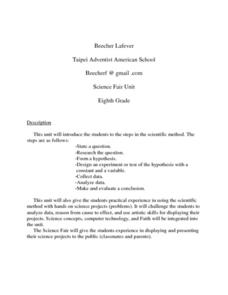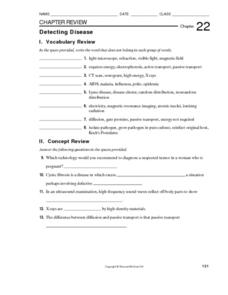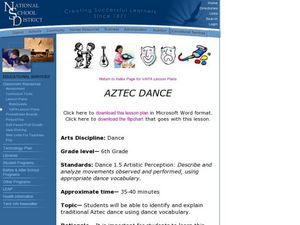Curated OER
Virtual Day in Archeology
Students use the internet to examine a day in the life of an archeologist. In groups, they discover what types of tools they use in the field along with the process of an archeological excavation. They complete a worksheet in which...
Curated OER
Day of the Dead
Learners study the Mexican celebration of Day of the Dead. They view a video and research questions on the Internet. They synthesize the information from the websites and the topic for their RAFT writing assignment. They write their...
Curated OER
SATP Multiple Choice II
Students explore strategies of identifying answers when given a multiple choice reading comprehension exam. Through a lecture and demonstration, students practice active reading by reading carefully, writing notes, and rereading. They...
Curated OER
Introduction to the Scientific Method
Students discover the scientific method. In this science lesson plan, students explore the steps of the scientific method as they participate in a classroom activity.
Curated OER
Chocolate Place - Factories around the world
Students create a PowerPoint presentation on how chocolate is made. In this chocolate lesson, students locate chocolate factories around the world, and study the process of converting the cacao seed into a chocolate bar. Students share...
Curated OER
Delicious Descriptive Adjectives
Students write out recipes with different adjectives then share them with the class.
Curated OER
Timely Tolerance
Eighth graders examine issues of prejudice and intolerance in the context of historical and comtemporary events. They discover the structure and tools necessary to plan, write, and create a museum exhibit.
Curated OER
Mathematicians are People, Too!
Students access the Internet to locate data regarding their assigned mathematician. They organize their notes on a data form, write a report, create a visual and present their facts to their classmates.
Curated OER
Mythbusters
Eighth graders watch an episode of Mythbusters and answer questions that arise in the video about the scientific process. In this Mythbusters lesson plan, 8th graders complete a scientific investigation based on the video.
Curated OER
Goddesses Are Personifications Too!
Students discover the use of personification as a way of expressing ideals. In this Language Arts lesson, students create an allegorical depiction of a contemporary ideal. Students write labels that clearly support the concepts that...
Curated OER
Why Are Thinning Trees Important?
Young scholars investigate thinning trees and why they are important to the forest. In this sustainable environment lesson, students role-play as if they are trees in the forest and simulate the overcrowding and inability to move...
Curated OER
Dividing by Two-Digit Divisors
In this math worksheet, students collaborate with a "study buddy" or "coach" to learn to divide by 2 digit divisors. Students follow the steps to go through the long division process. There are 4 problems.
Curated OER
Ducks
Young scholars explore and learn about the habitats, diets, and specific attributes of various species of ducks. Students know the names of at least seven species of ducks and at least five criteria for identifying species of ducks.
Curated OER
This is Your Rock, This is My Rock
Students study the identity of rocks and minerals that can be found in Utah. They examine the characteristics that identify the rocks and minerals by using a hand lens and write them down on an index card. They role play as detectives by...
Curated OER
Cool Word Vocabulary
Students practice using new vocabulary by putting a picture with the new word. They also write the definitions of the new words. They use the pictures to create a clue in which others can practice the new words.
Curated OER
The Energy Trail
Students examine the relationship between the products they use and energy use. Using the internet, they identify the role that manufacturing plays in using energy and the emissions that change the climate. They discover the steps to...
Curated OER
Priorities and Goal Setting
Students discuss their goals and the steps needed to achieve their goals. They list the internal and external forces that may help or hinder their goals. Students prioritize the forces that hinder and/or help them to achieve their goals.
Curated OER
Science Fair Unit
Eighth graders explore the scientific method. After choosing an approved science fair project, 8th graders go through the scientific method process. Students gather information to analyze data and evaluate a conclusion. They write a...
Curated OER
Just Get to the Good Part
Learners summarize nonfiction text. After reviewing the steps for summarization, students independently read a nonfiction article. They write a summary paragraph using the six-step process outlined by the instructor during guided practice.
Curated OER
Lesson 3: Making Predictions
In this making predictions worksheet, students read a newspaper article, locate the "Five Ws and the H," and then make logical predictions on the content that they read and then analyze those predictions based on a rubric.
Curated OER
Detecting Disease
In this detecting disease activity, students will review the different tools scientists use to identify diseases including the steps of Koch's postulates. This activity has 14 fill in the blank and 4 short answer questions.
Curated OER
Solving Problems
In this solving problems worksheet, students answer twelve multiple choice questions about problem solving in science and the steps of the scientific method. These include identifying the problem, forming a hypothesis and setting up the...
Curated OER
Aztec Dance
Seventh graders study Aztec dance to learn about their culture and civilization. In this Aztec study lesson, 7th graders watch a video of Aztec dancers and describe the dance on an index card. Students visit a website to learn the...
Curated OER
Pizza Topping Combinations
Learners brainstorm pizza toppings and determine the number of possible ways to order a pizza. In this algebra activity, students analyze and investigate geometric patterns as they relate to the concept of a variable. Learners then use a...



